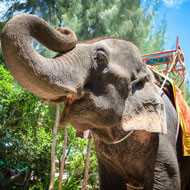TripAdvisor to stop profiting from animal tourism

The website will no longer sell tickets for elephant rides, which have been cited as one of the cruellest forms of wildlife tourist entertainment.
Global online travel giant, TripAdvisor, announced yesterday (12 October), that they will no longer sell tickets to cruel wildlife activities. A 558,000 strong petition, launched by World Animal Protection less than six months ago, has sparked the decision.
The Wildlife Not Entertainers campaign has been running since 1991, ending bear dancing in Greece, Turkey and India, and the latest breakthrough is a step towards ending elephant rides, tiger selfies and swimming with dolphins.
In an ongoing pledge to raise awareness of animal tourism cruelty, TripAdvisor will launch an education portal to further educate tourists about the impact and resulting cruelty of certain wildlife tourism.
Notably, the website will no longer sell tickets for elephant rides, which have been cited as one of the cruellest forms of wildlife tourist entertainment
Steve McIvor, CEO at World Animal Protection said:“We congratulate TripAdvisor on taking this important step towards ending the cruel wildlife tourism entertainment industry.”
Despite this response from the travel company, certain venues that host cruel animal entertainment are still bookable via TripAdvisor and its Viator brand.
Mr McIvor continued:“We hope it will only be a matter of time before TripAdvisor will also come to realise that it has to end sales to all cruel wildlife attractions such as SeaWorld where the animals endure a lifetime of abuse and highly stressful training to perform.”
TripAdvisor join over 100 other global travel companies, including Contiki, Kuoni Travel and Intrepid, who have agreed to no longer offer visits to venues with elephant rides and shows.



 The Veterinary Medicines Directorate (VMD) is inviting applications from veterinary students to attend a one-week extramural studies (EMS) placement in July 2026.
The Veterinary Medicines Directorate (VMD) is inviting applications from veterinary students to attend a one-week extramural studies (EMS) placement in July 2026.